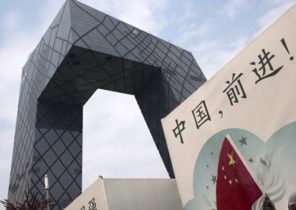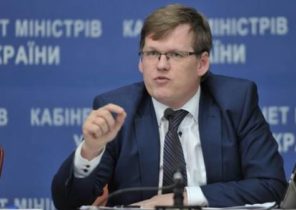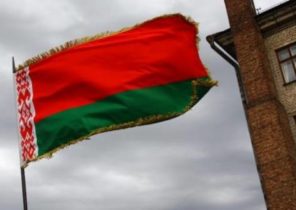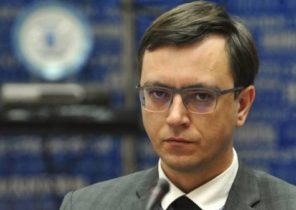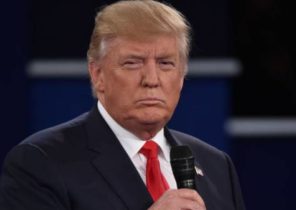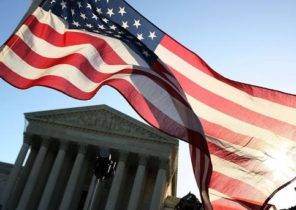When European countries and the United States celebrated the 75th anniversary of the victory over fascism in the Second world war, the quarrel between the U.S. and Russia have destroyed the atmosphere of “Western unity”, which was supposed to emerge. In the center of the discussion was “issue status” of the Soviet Union in the Second world war in a “time of celebration and reflection,” the Ministry of defense publicly stated that the Second world war began, when the “Germany and the Soviet Union invaded Poland” and the White house released video footage of Donald trump, where he argues that “America and Britain defeated the Nazis”, and never says one word about the contribution of the Soviet Union in the victory.
The Russian side rightly expressed strong dissatisfaction. The representative of the press service of the Russian foreign Ministry has criticized the US for “attempting to use political motives for the distortion of history” and called the actions of the States “false and hypocritical”. President Vladimir Putin angrily condemned the act: “Those who are trying to rewrite history, there can be no excuses.” With the aim of “de-Sovietization” in European and American academic and political circles have never stayed hidden currents to rewrite the history of the Second world war, and in recent years has accelerated the pace of transparency and politicization. Rewriting the history of Europe and the United States is another form of “narrative of struggle”, which aims to suppress the space of Russia’s soft power by changing or distorting the historical memory.
From a hidden course to the open politicization
Because it took not much time and there are still live historical evidence, history of the Second world war initially was always the “actual history”. In fact, however, is still never for a moment did not stop the controversy about the history of the Second world war.
Even during the cold war, when the United States and Western Europe, the Soviet Union and the countries of Eastern Europe divided into two hostile camps, the West was considered ideologically communism and Nazism to the “dark evil forces” and was looking for the increasingly irrefutable ties in politics and history between Stalin’s Soviet Union and Germany of the Hitler era.
In 1980-ies in European and American historical circles, there’s been a tendency to “historical revisionism”, which tried using the re-designed historical record to refute historical views, recognized in the academic, political and social environments, thereby obtaining the “right of private interpretation” of history. At that time German scientists were trying to find and establish the “causal link” between Soviet Bolshevism and Nazism, claiming that “the concentration camps of the Stalin era was the logical and actual prelude to Nazi genocide”. And the Nazi genocide stems from the fear of Bolshevik “class massacre” and in a sense is a “response” to the latter. Thus, the invasion of the Soviet Union by Nazi Germany in 1941, it was a kind of “preventive war” with the nature of self-defense that did not allow the other party in advance to begin the offensive. This is an attempt a small number of Germans using the rethinking of history to downplay or absolve themselves of blame for the outbreak of the Second world war and, objectively speaking, to establish or lay the idea in the “head” of the Soviet Union that he was the “original culprit” of war.
After the end of the cold war and the collapse of the Soviet Union and East European socialist bloc countries in Eastern Europe in the process of self-Westernization has made numerous historical and narrative amendments. “Desovietization” was aimed not only at the period of the socialist camp, but also spread up to the Second world war, and furthermore, appeared almost simultaneously in the scientific, political and public circles. These countries tried to break historical ties with the Soviet Union by direct disassembly or removal of military monuments of the red Army, the failure of a joint celebration of the victory over fascism in the Second world war and renaming of geographical names connected with the Soviet Union. At the same time, these countries through numerous scientific studies, the mouths of political figures, through works of literature, film and television and the social education of rewriting historical memory. And the Soviet Union from the role of “liberator” during world war II and “big brother” during the cold war was transformed into a military “aggressor” and political “oppressor”.
In recent years, on the background of aggravation of geopolitical competition between Russia and the West, as well as political changes in Europe and the United States, and especially the growth of populism in European countries and the United States began a new stage of rethinking of history. Some European countries have publicly accused Russia that it “was not only the victorious countries in world war II, but Nazi Germany was the aggressor, and therefore needs to take historical responsibility for the outbreak of war.” In the result of the rewriting of historical memory and generational change in society that Americans and Europeans are also more likely to replace the historical knowledge of the realistic feelings, so understanding the historical role and status of the Soviet Union in the Second world war in some countries has become a kind of elastic band, which regularly stretches and shrinks over time and under the influence of political changes.
For example, the French public opinion poll from 1945 to 2015 showed that the proportion of people who believed that “the Soviet Union made a great contribution to the victory in the Second world war” has fallen from 57% in 1945 to 25% in 1994 and continued to fall to 23% in 2015. On the way from hidden currents and to open the politicization of European countries and the United States, going to a pre-set course, changed the role of the Soviet Union in the Second world war to provide a logical structure and the social basis for the United States to open the rewriting of history and narrative initiation of disputes.
The true meaning of historical disputes
In the process of strategic confrontation between Russia and the West making Europe and the United States revisions in the history of the Second world war had a huge impact on the space of Russia’s soft power.
President Putin realizes that he, Europe and the United States has “a huge difference in the view of the Second world war”, and “lies about the war has spread worldwide like an epidemic.” With this purpose the Russian government specifically called this year “the year of memory and glory” and proposed to create in Russia a global network of archival documents of the Second world war, to “honor the memory of the heroes, to respect the past and protect the historical truth for future generations.” It was also decided to hold a Grand celebration on may 9 to change this unfavorable situation.
Shortly before the “historical dispute” between the United States and Russia, the two countries are surprisingly loud and together celebrated the 75th anniversary of the events in the Second world war, meeting on the Elbe. Leader of both countries stressed that “the”spirit of the Elbe” is an example of how two countries can put aside conflict, to build trust and cooperate for a common purpose.” This is a common historical narrative used by the United States and Russia to signal and influence the current international situation. Its aim is to ensure that both countries can continue to maintain this spirit and to work together to confront “the most important challenges of the XXI century”. The external world then believed, that Russia from the point of view of diplomacy made an excellent tactical counterattack with the help of historical narratives, not only to soften relations with the United States and the West, but also re-affirming its strategic position on a par with the United States.
But just two weeks the United States has publicly exclude Russia, which has recently noted a meeting of the allied forces during the war, from among “the victorious countries in world war II”. This once again shows that no matter how much European and American policymakers wish to achieve the dream of “joining the West”, luring to their side after many politicized historical edits and constant reassessment of the history of European and American society is no longer able to quickly take Russia for “a” based on your own logic and public opinion. Moreover, under the banner of “America above all”, trump will never allow Putin to stand next to him side by side as the winner of the Second world war and “the founder of the new order.”
Cui Hunstan (崔洪建) — Director of the European Institute of the Chinese Academy of international studies
